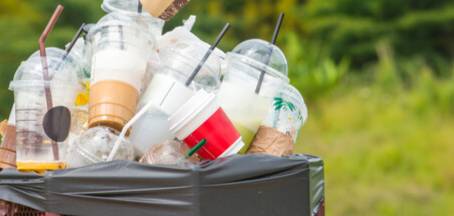
Germany and New Zealand are heading towards an end to single-use plastic.
After France, which withdrew certain products such as straws, cutlery or sticks in early July, it is Germany's turn to ban the sale of single-use plastic. The decision took effect on July 3, 2021. Passed in September 2020, the law notably prohibits cotton swabs, cutlery, plates, straws, stirrers, balloon sticks, cups as well as certain polystyrene packaging . The text follows a European directive adopted in 2018, after several months of negotiations between member states of the European Union, banning a dozen categories of plastics.
As regards the stocks of products already manufactured, they will remain on sale beyond 2021 until complete exhaustion. However, the law does not apply to all products. Some will remain authorized, such as wipes, cigarettes with a plastic filter, hygienic tampons among others and for which alternative solutions have not yet been found. But they will now have to carry a label informing of the damage that plastic causes to the environment and encouraging them to dispose of it properly. With this new law, German administrations will have to give preference to products made from recycled materials when they are in the period of tenders for supplies, in order to encourage the circular economy.
On the other side of the world, New Zealand adopted an identical law. Since the end of June 2021, the New Zealand government has presented a three-axis plan to get rid of a long list of these everyday objects between 2022 and 2025. During these three years, straws, bags, cutlery, cotton swabs, fruit labels, food and beverage packaging made of PVC and polystyrene, will have to be removed from sales areas in the country. David Parker, New Zealand Environment Minister, Mr David Parker, said firmly: “We encourage businesses and the public to find reusable options. We know that alternative solutions are readily available, including recyclable plastic or paper items. Statistics show that New Zealanders throw away an average of 159 grams of plastic waste per day, making the country one of the biggest offenders when it comes to plastic consumption. "The New Zealand government is also highly interested in coffee cups and baby wipes. But Mr Parker said work needs to be done to create alternatives and that the government will announce next steps for these items next year. The government also announced the creation of a fund allowing companies to research alternatives to disposable plastics.
These measures follow similar bans abroad. Banning plastic bags is now commonplace around the world. The UK introduced, for example, a ban on plastic straws, shakers and cotton swabs in 2020. The EU voted in favor of a ban similar to the one introduced this year.
It is regrettable, however, that in some countries, the Covid-19 has blocked this general drive to abandon plastic. Several US states lifted plastic bag bans and shelved new legislation when the pandemic peaked. Environmental groups have, for example, reported huge amounts of Covid waste "- including plastic gloves,
But the movement is initiated. Even if there is still a long way to go, we can only rejoice at the announcement of the decisions taken by these governments. Other countries will be added to the list and thus continue to reduce the production of plastic in the world. As a sign of encouragement, the European association of plastics producers, PlasticsEurope, recently recalled that: “ with 367 million tonnes of plastics produced in 2020 [in the world], against 368 in 2019, this is the third global decline since the post-war period, after that which occurred in 1973 at the time of the first oil shock, and that of 2008, during the subprime financial crisis ”.
An enthusiasm, it is true, somewhat tempered by the World Wide Fund for Nature (WWF) according to which "the global production of plastic waste could increase by 41% by 2030 and double the quantity present in the oceans to reach 300 million tons. "
So don't let go of the pressure. Government decisions, aid for companies to develop eco-responsible alternatives and information to the public are probably the winner.
Posted on 2021-07-07 10:18








Comments